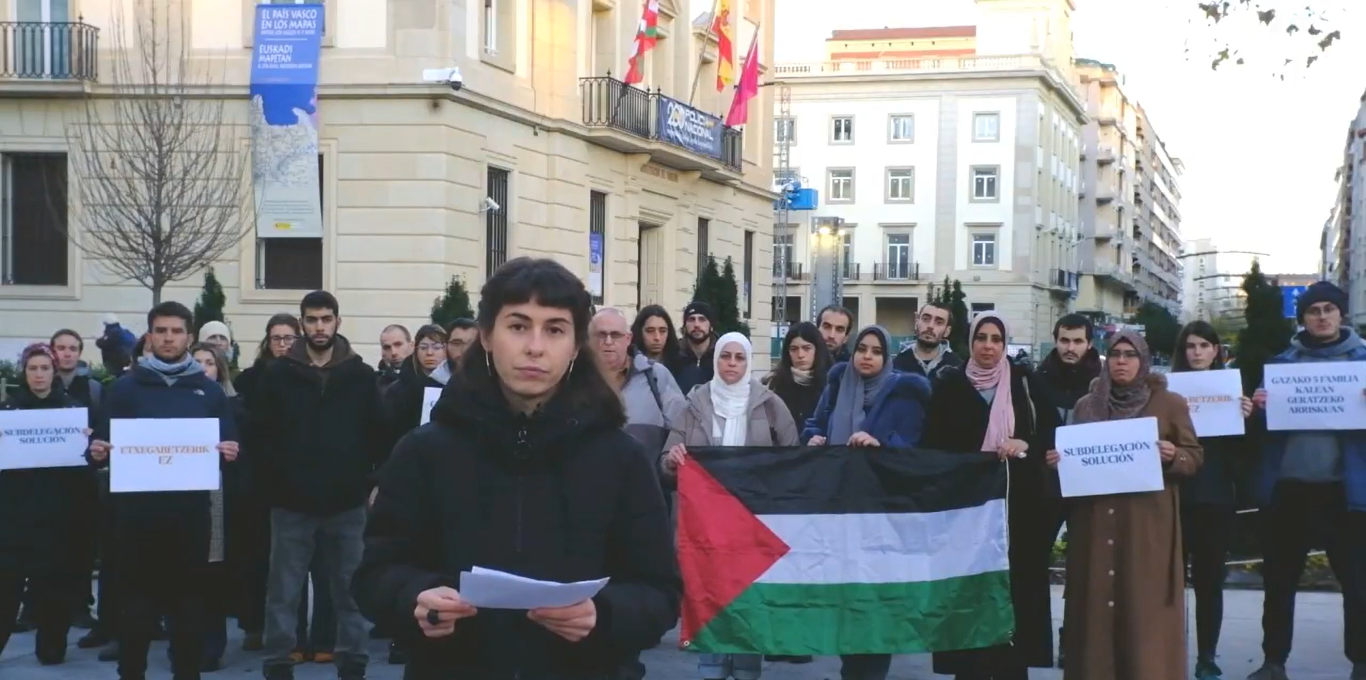To the old problem, new forms of organization
- If we have been sent messages until we have been satisfied, it is time to stay at home. However, even though we have been ordered to close between four walls, housing has not become a guarantee. If housing became increasingly inaccessible before March, the pandemic has exacerbated the problem: unemployment has increased considerably and in recent years the price of rentals, which are extremely expensive, has not fallen; the difficulty of paying rent is hitting more and more houses. In this context, and knowing that the next economic crisis will make it even more extreme, in Euskal Herria there was the explosion of the housing unions in the return of the confinement. After several months of work, we wanted to know what they are.
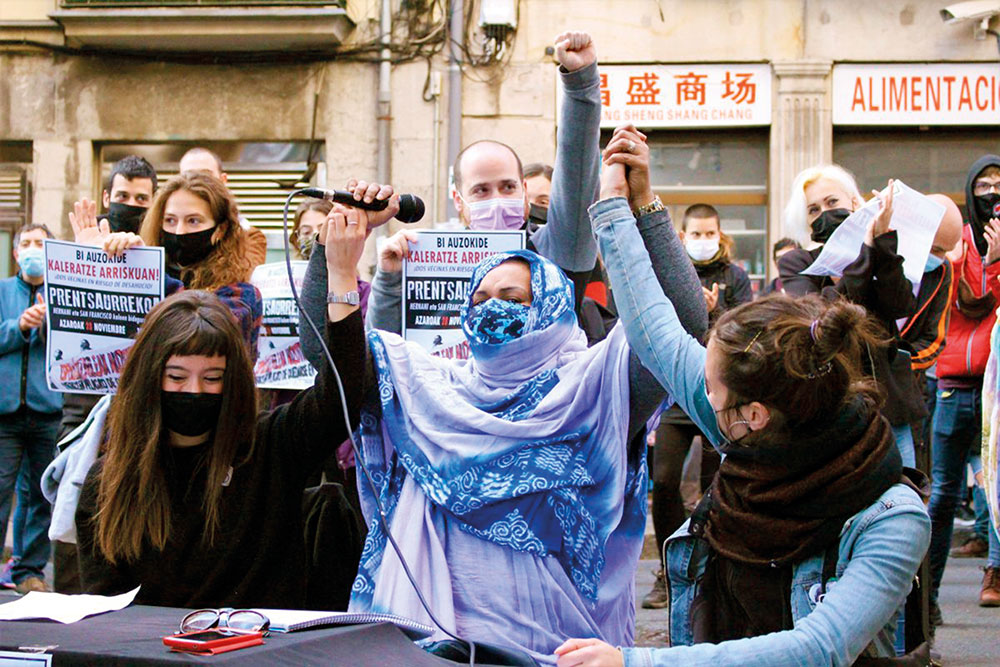
November 1903, Bilbao. It's time for industrialization and industrialization and for workers. This demographic change has caused an excessive increase in the demand for housing in urban centers and, being the supply inferior to the demand, many owners have seen in it the possibility of obtaining a greater economic benefit, tending to the relationship between tenants and owners. The newspapers of the time are witnesses of the emerging conflict, as they deal with the tenants that are being organized. “As a result of the arbitrary taxes that the City Hall has imposed on the property, some owners have increased the rent by ten pesetas. The local neighbours are about to make a peaceful protest. There is talk of a tenant strike,” he reads in the Journal of Reus of Catalonia. Half a year later, in July 1904, a meeting of tenants, which is about to materialize, occupies the lines of some newspapers, and it is at that time that the Union of Tenants of Bilbao was created to demand the reduction of rent. The fire of the tenants’ struggle is experienced, and it is probably the flame of that fire that causes the rent protests to erupt in Barakaldo in 1905. The mobilizations, led by women, will become a hire strike and before it the authorities will set the state of alarm.
In the first decades of the 20th century we can identify the starting point of a “new cycle of tenants’ struggles”, as defined by El Salton Jordi González Guzmán and Irene Sabaté Muriel, One Hundred Years of Struggle for the Reduction of Rent: the Decree of 1920 (One Hundred Years of Struggle for the Reduction of Rentals: Decree of 1920) in the report. “How the rent strikes spread throughout the cities, and from their ashes emerged the unions and tenants’ associations,” says Jordi González in reference to the time Rental Strikes: Revolutions to Punto Cero (Rent Strikes: Revolutions at zero point). The events of the entrance would be the reflection that had the beginning of this new wave in ours. However, as González nuances, from these powders will emerge various experiences and struggles “blank chapters that appear in the history books of popular movements”. In the Basque Country, the deficiencies are also noticeable by pulling the line of the struggle for housing, but in the timeline of recent years various expressions in favor of the right to housing can be identified: among other things, the struggle for the right to housing has been under the umbrella of the occupation movement for many years, and the Mortgage Affected Platform maintained its wave of eviction after the 2008 housing crisis. Recently, several newly created groups have joined the long-distance struggle, and the unions, groups or networks of tenants are increasingly numerous in the long and wide Basque Country.
In general, they converge in their functioning: collective advice is offered to the member with housing problems, in order to solve the conflict and, at the same time, to collectivize the knowledge that exists in the collective in this area. In this process, they also highlight the structural – and therefore collective – nature of the problem that is usually presented to us as individual, since those who today have a problem will help those who come tomorrow with a conflict, from experience. And while this work is being carried out, the group is forming itself in self-defense and mutual protection, increasing its capacity for influence.
Containment per hour
Will the housing bubble explode the Coronavirus published in ARGIA number 2694? The report recorded the explosion of housing unions in the Basque Country. It reflected the increase of housing problems by COVID-19 and referred to the unions that had not responded to this context. Apart from the Vitoria-Gasteiz Housing Union, which has been active for two years, the rest of the groups have turned to the pandemic. We talked to some of them shortly after the lockdown, and after several months we have resorted to some groups again to know how the practice of this section has gone.
When we ask them about the last few months, all the interlocutors are further away than in March. The first steps had been taken as soon as they were presented publicly. In other words, the growth of housing unions has not been spontaneous and overnight. Surely that has to do with the trade unionism that has been developing in other countries in defence of housing. Thus, one can conclude by listening to the words of the Galdakao Housing Network: “In some brigades to Catalonia we had the opportunity to learn about the experiences of the area. We thought it was interesting to bring into our land the organizational models they obtained in the neighborhoods and towns and the ability to create fighting communities.”
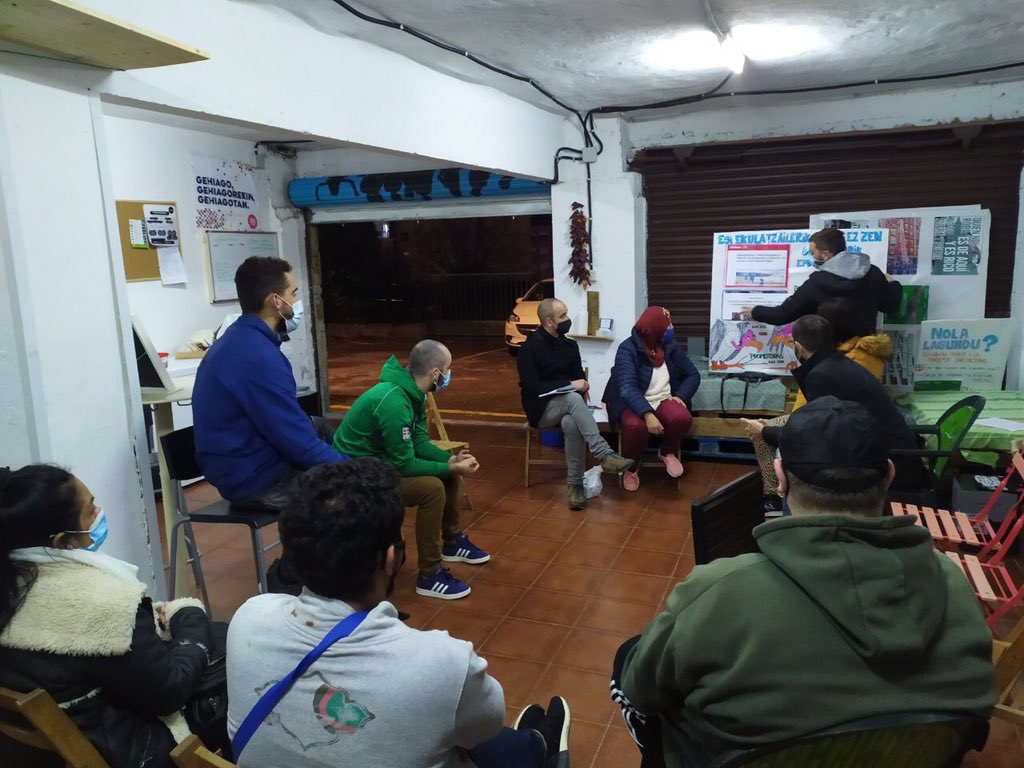
Some have found in this form of struggle an adequate organizational model to give continuity to the work undertaken by other agents, as is the case of the Housing Group of the Casco Viejo de Bilbao AZET. As they have explained, the issue of housing is not new to them: “We came from the Piztu Bilbo dynamic, and there came the key ideas that pushed us to create AZET: the class struggle we wanted to raise from the slums and giving a collective response to individual needs. From a class perspective, neighborhood defense codes and neighborhood power.”
The pandemic has only pushed groups to act publicly. “In the region there was a small group that wanted to carry out its work around housing, and the confinement made it realize the urgent need for its activation,” says Batu Elkarlaguntza Sarea of Hego Uribe. They have stressed that from the outset they have made it clear that they wanted to go beyond housing. “We believed that the network should be geared towards meeting all the needs of life,” they explained. In the same vein, AZET has spoken: “Our intention is not to limit itself to the housing problem, we understand it as the starting point of the new expressions of the class struggle. They ordered the confinement, and in this new juncture, with a health crisis that would be added to the real estate crisis of recent years, we realized that housing could be the gap to begin to respond to the material needs of the expropriated”.
Comprehensive look
Like Batu and AZET, the Galdakao Housing Network uses a vision and strategy that transcends housing. It responds to housing problems in the town, but is also a member of Batua, in the opinion that the struggle for housing is partial and that “being within a group that works other problems allows to have a broader view”.
In Batú they are clear that their action must be comprehensive. They identify housing as one of the elements that best contains the contradictions that emerge in capitalist society, and that is why they have an open line of work in this direction. “Housing as an essential element for the reproduction of life is the demand for any means to achieve and maintain it,” they say. But other fronts are also open because housing is “a resource for the survival of workers and for the reproduction of life”, “but not the only one”. That is why they decided to set up the Subet Solidarity Warehouse, through which half a hundred people have been able to meet their food and cleaning needs until today, performing concentrations in the surrounding villages. In the same vein, AZET has recently created the Asetu People's Warehouse.
Add: “Housing as an essential element for the reproduction of life, it is our position to assert any way to achieve and maintain it”
The APR speaks clearly: “The struggle for housing is not an objective, but a means to revitalize class organization. In order to organize a fighting community, we have begun to organize housing around the problem”. Having said that, they wanted to make it clear that this does not detract from the issue of housing, but rather places it “in a more comprehensive framework”. They argue the statement as follows: “With the economic crisis and the housing bubble, we see the strategic importance of housing in this historical phase. Housing will be a fundamental space in the class struggle that will be played in the coming years”.
The members of the Donostia-San Sebastian Renters Union have stressed that their work is not limited to collecting cases with housing problems, but that what they are looking for is, among other things, to make the neighbor see that they have problems that if they are added they can solve the problems. “We are working in this sense, warning that the problems we can have with housing are not individual, but collective,” they point out. This is directly related to an aspect that the other groups seek with their activity: forming a fighting community. To achieve this, Batu considers that “breaking with the care philosophy” is one of the keys that distinguishes “other warehouses that meet the basic and food needs”. They see in the landing of assistentialism the way to boost the participation of those who receive from the network, to extend the thought of mutual help and, ultimately, to extend the fighting community. That is what they get, among other things, by encouraging people to participate in food collection or to join the auzolans. In his words, “there are many ways to help the network, and we think that’s one of the great strengths we have.”

Short but intense journey
All the interlocutors were put into practice during the confinement, so their experience is based on the short term. The context, however, has not left them opportunities for tranquillity. Looking back, Batu has recognized that the journey made during these months has been “sometimes hard”, “because it is always difficult to start such a project, and more in the situation in which we live”. However, they have not lost time: in addition to the food store, there have been solidary shelters in local shops, so that families in need can obtain fresh food; and they have devoted much of the time to their training. They say they have gained experience trying to manage censuses, negotiating rents, legal training, knowledge of subsidies… trying to respond to situations never before experienced. However, they do not doubt what the most precious achievement is: “We have had the opportunity to create a small family, and working in that environment makes it easier.”
AZET appreciates the progress made to date. They say that the initial hypothesis is being confirmed with practice: “The workers, alone, are helpless to a great owner, but together we are unstoppable. We believe that the group can be an effective instrument for the unity and articulation of the working class”. As you have explained, they have so far focused on finding solutions to the problems of the people who have approached, and have also sought a space to publicly denounce the abuses of the owners. In September, and being just a couple of days of maneuver, they also managed to prevent the eviction of a neighbor and negotiate a housing alternative for him. But above all, like the United States, the achievement they most cherish is the construction of the political community.
TESTRA: “The workers, alone, are helpless to a great owner, but together we are unstoppable. We believe that the group can be an effective instrument for the unity and articulation of the working class”
In Galdakao and Donostia-San Sebastián, the activity has focused on holding weekly assemblies since the end of the confinement to work on attendees’ problems. However, the state of alarm has made them an obstacle in that direction. The workload has been increased for the Galdakoztarras, at a time when the measures hinder their activity: “The severe economic crisis we are experiencing has generated a large number of people with housing problems that affect our activity, as many people contact the network due to the emergency situation.” The Union of Tenants of San Sebastian, for its part, decided to suspend the weekly meetings before the new context, with the only exception that when someone has a housing problem, they make a personal appointment with him. “We understand that welcoming is necessary in these situations,” they have defended.
However, the Donostiarras have not stopped their activities due to the cancellation of their weekly meetings. The union, accepting the limitations that the context entails, has decided to use the state of emergency to advance work internally, both in the organization and in communication. They also state that “they did not want the exceptional situation of tenants to lose importance. We wanted to keep working, to show that we can be responsible and that doesn’t just mean meeting telematically.” Thus, despite the restrictive measures, ways have been found to make the situation of tenants visible, such as making public the conflict they maintain with Sareb (Company for Asset Management Arising from Bank Restructuring) in building 22 of Egia Street, which does not want to renew the rental contract to twelve tenants of it, risking its dismissal.

Challenge Motivation
Although they have been at a steady pace since their inception, the rapporteurs have shown more strength than tiredness. They are aware of the motivation when they look to the future, although there are not few challenges they have identified in this path.
The Donostiarras say that their demands must go beyond asking for rent regulation. Bilbaínos have pointed out as the main challenge the crisis we have, in which housing is going to have centrality. They also want to look at whether people who approach AZET with a problem stay in the group: “That would mean that we are getting the constitution of a political community with neighbors of the same class.” The Galdakoztarras want their dynamics to be known and rooted in the people, with the aim of attracting new participants and forming a “strong fighting community”. They also focus on developing their capabilities to “efficiently respond to the many problems that come”. Meanwhile, Hego Uribe's projects frame the toughest housing challenge within their multi-axis project. However, they have as main challenges the same points that have as their objective: to satisfy the basic needs and to deepen the strengthening of the fighting community. All of them, although they have only just begun the road, have what it takes to make a rich journey: the north clearly.
The poor management of the Valencian cold drop has led to a change in adverse meteorological alerts, as shown in the first season of "winter". Faced with the threat of rivers overflowing in Hego Euskal Herria, the indications for protection came along several paths, since no... [+]














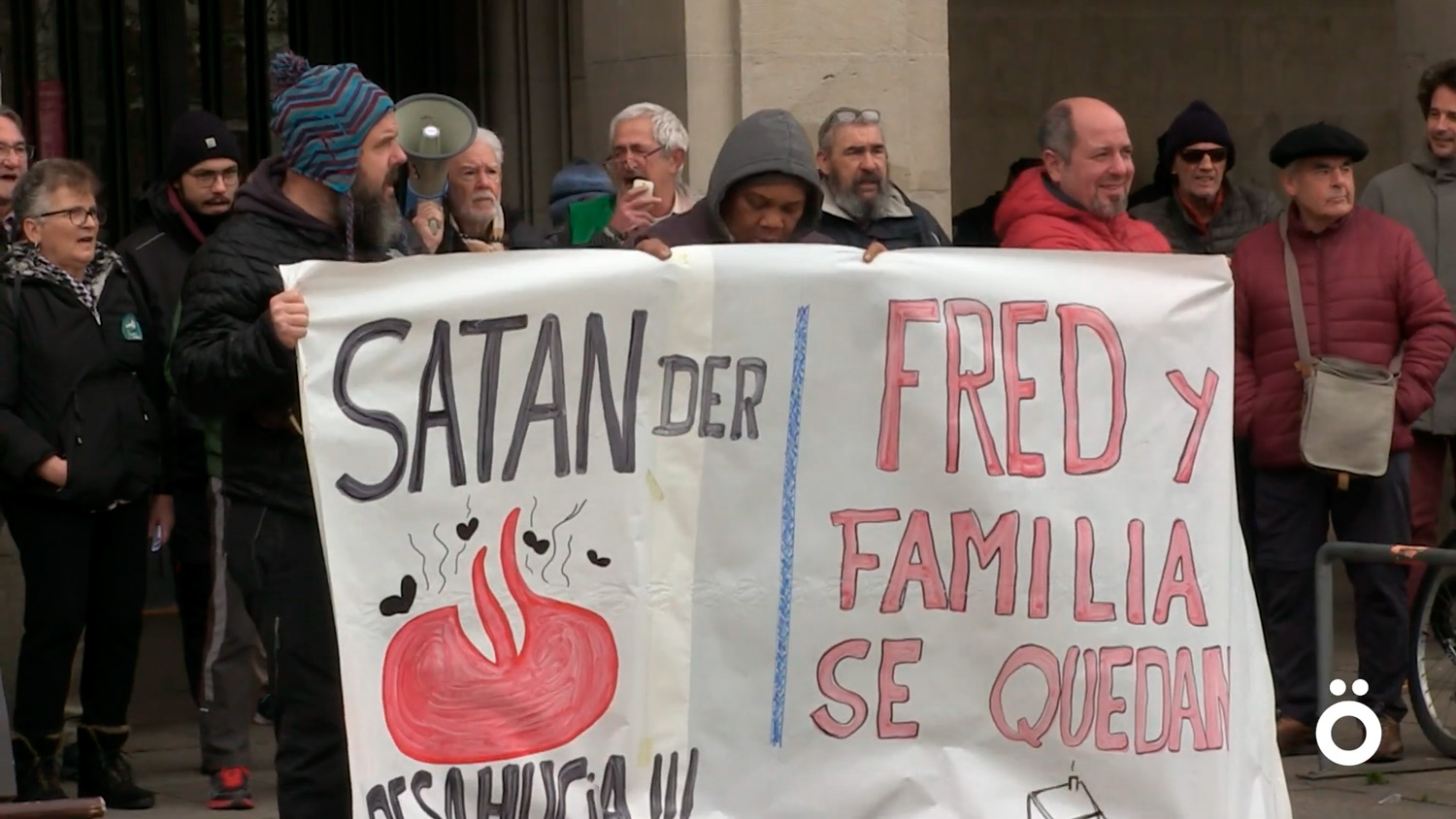
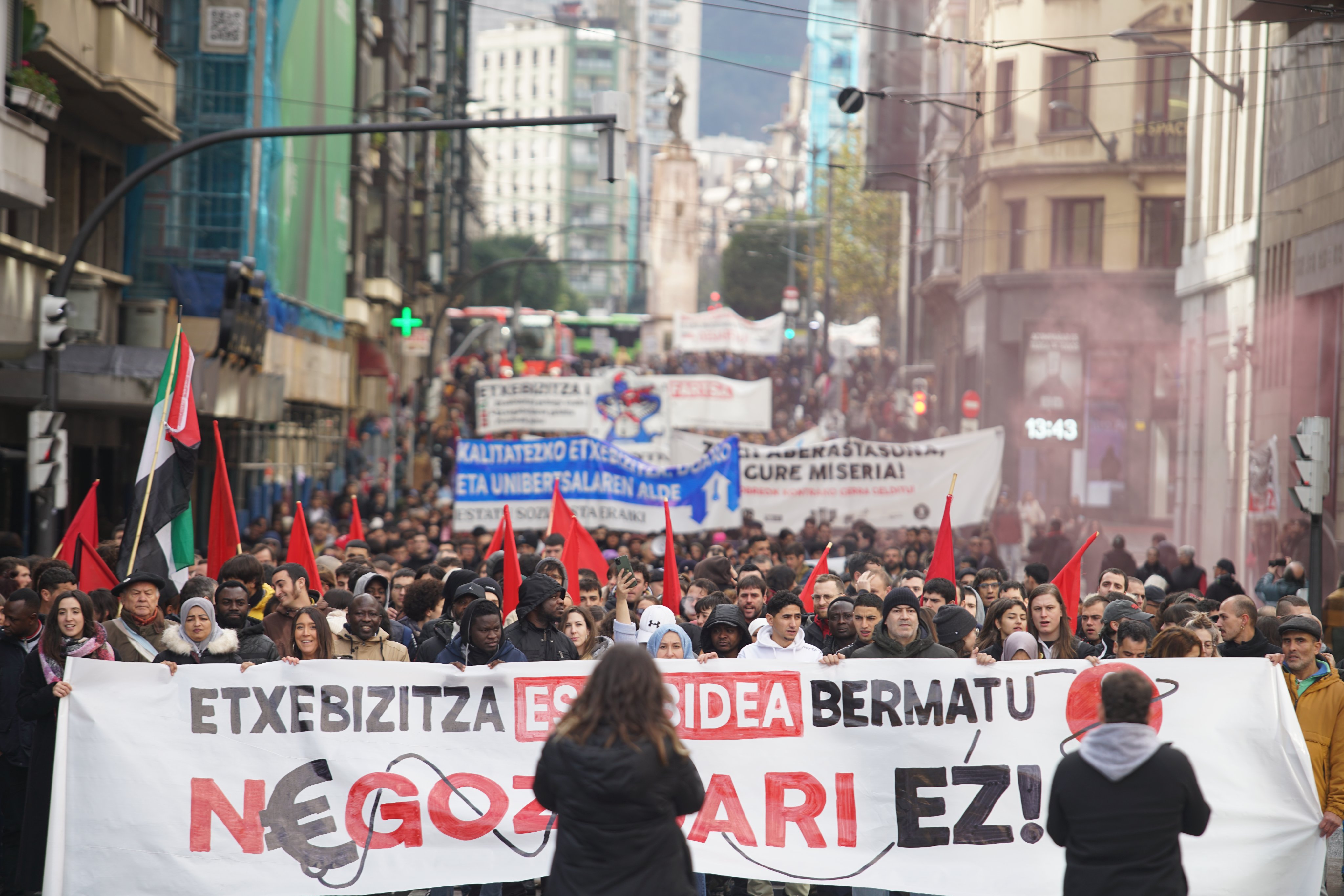

.jpg)

